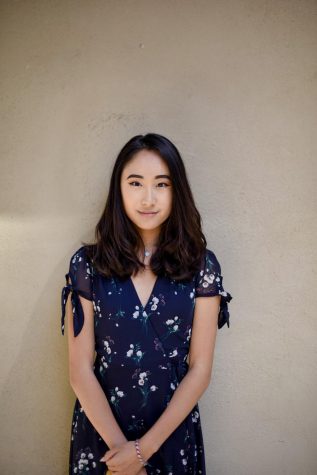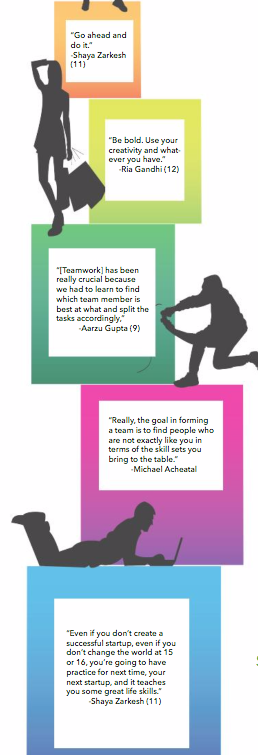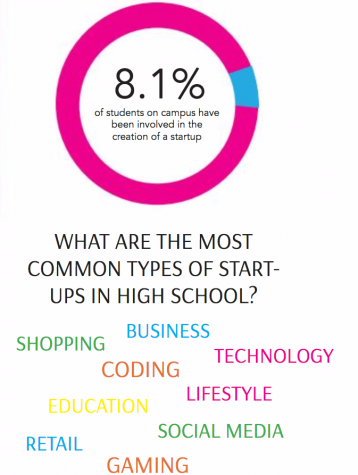Started from the bottom
Silicon Valley is brimming with innovative minds, several of whom harbor dreams of launching and leading their own businesses. Yet many of these up-and-coming entrepreneurs aren’t graduate students or business magnates—they’re high schoolers.
In recent years, various upper school students have created their own small companies, propelling themselves into the rapidly expanding field of entrepreneurship. Like any company on the path to success, these student-run startups are established on a foundation of dedication and teamwork.
“In order to start a startup, you have to be really devoted to your product. A lot of people start different projects or companies, and they’re like, ‘I’m just doing it for the money,’” said Neeraj Aggarwal (11), the founder of startup Elore and president of startup-focused club MIT Launch. “It sounds cliche to say that you need to be devoted to your product, but if you don’t really believe in your product, there’s no way you’re going to be able to see it out into the market.”
These prototypes evolve as research is conducted, new marketing ideas are set into motion and members of the startup find innovative ways to create a more viable product.
“We’re always thinking and brainstorming about how to make the product better, how to add more features to it, how to make it more enticing,” Shaya Zarkesh (11), the founder of tech startup PolyUp, said. “It’s a lot of going back and forth and taking people’s ideas into account.”
Along with dedication and creativity, teamwork is also an important factor in the formation of a successful company.
“Typically, a startup company will start with a founding team of more than one person. Typically it’ll be two [or] three people because there’s a lot of different qualities that are needed, and it’s very rare for one person, especially at a young age of being a high school student, to have all of those different attributes,” Michael Acheatel, upper school business and entrepreneurship teacher, said. “Really, the goal in forming a team is to find people who are not exactly like you in terms of the skill sets you bring to the table.”
MIT Launch, a club designated to helping students with startups, aims to stress the importance of teamwork in the business world. Members of the club are separated into teams of three or four that together develop ideas for companies or platforms.
“[Teamwork] has been really crucial because we had to learn to find which team member is best at what and split the tasks accordingly,” Aarzu Gupta (9), a member of MIT Launch, said.
The formation of a successful company not only requires coordination between team members but also innovation so that the company can find a new corner of the market to address.
“Be bold. Use your creativity and whatever you have,” Ria Gandhi (12), the founder of extension Cleo, said. “Being able to do that once in high school, it sets you up for doing better things in the future. I think that I learned a lot from the experience. It really showed me after putting hard work into something, you can really get a lot out of it.”
Despite all the challenges in starting a company in high school, many students continue to explore the vast field of entrepreneurship throughout their academic career.
“A lot of time [student entrepreneurship] is looked down upon for some reason, but [it doesn’t matter] what everyone else says,” Shaya said. “Even if you don’t create a successful startup, even if you don’t change the world at 15 or 16, you’re going to have practice for next time, your next startup, and it teaches you some great life skills. So go ahead and do it.”
Neeraj Aggarwal (11)
Along with his teammates, Neeraj Aggarwal (11) has created four different platforms through MIT Launch that have gained national attention.
“I think having a team is really important because it offers different perspectives as to which direction to take your company,” Neeraj said. “For example, if I had a really designated path I really want to go down but my partner sees a different opportunity, we can reach some sort of compromise that makes the best of both worlds and essentially evolve the company into something that maybe I might not have seen it to be in the future but also something that actually helps more people.”
One of his platforms is a technical recruiting company called Elore, launched in August 2016. It connects high school coders with recruiters from companies and helps students find internships and opportunities. It also allows students to present their portfolios while expanding their skill sets through different tests and activities.
“I’ve learned that there are a lot of opportunities out there that you may not realize and that different markets are open even if it’s small,” Neeraj said. “Being able to create your space in the market is definitely possible if you work for it, and that’s definitely not something I would have considered beforehand.”
Shaya Zarkesh (11)
Shaya Zarkesh (11) founded tech startup PolyUp the summer before his sophomore year as a means to broaden the horizons of a research book he was writing under the mentorship of a Stanford professor. Aiming to “empower the next generation of creative problem solvers,” Shaya and his team at PolyUp continually create educational video games revolving around STEM topics such as mathematics and computational thinking.
“Polyup has taught me a lot about how to express myself, how to work in a team, how to be confident in talking to people and how to express my thoughts in a way that’s going to be valued but at the same time is effective in what I’m trying to convey,” Shaya said.
Shaya plans to continue his enterprise through PolyUp, and then hopes to pursue his passions by working as an entrepreneur after high school.
“I’ll go until [PolyUp] fails, and so far it’s going fine. We haven’t had wild successes yet, but we’re going towards that path,” Shaya said. “I totally plan to be an entrepreneur. I know it can get tiring, always being on the forefront of innovation and working 12 hours a day, but it’s also really rewarding to have something that you made yourself actually make a difference in people’s lives.”
Ria Gandhi (12)
Ria Gandhi (12) is the co-founder of Cleo, a Chrome extension that allows users to purchase multiple items from multiple websites in one shopping cart. She works as part of a team of four entrepreneurs from across the country to develop and manage the startup.
“Starting a company is a marathon, it’s not a sprint—just like a lot of other things that you do in life,” Ria said. “I learned that entrepreneurship is definitely something I’m interested in in the future, like I’m attending Penn next year, so I want to do some kind of social entrepreneurship while I’m there, maybe start a nonprofit, basically do something for a societal impact and for the greater good.”
Ria participated in the summer branch of MIT Launch, which put her in a team with three other students from around the nation.
“It’s been tough being able to coordinate,” she said. “The other three are in college, I’m going to be in college next year, so we haven’t been able to grow the company that much only because of the fact that we all live on different corners of the country and it’s really hard to coordinate.”
This piece was originally published in the pages of The Winged Post on January 24, 2017.

Kathy Fang (12) is the editor-in-chief of Harker Aquila. This is her fourth year on staff. From covering local marches and protests to initiating Harker...
Prameela Kottapalli (12) is the Editor-in-chief of the Winged Post. She enjoys spending time with her fellow staff members...


















![“[Building nerf blasters] became this outlet of creativity for me that hasn't been matched by anything else. The process [of] making a build complete to your desire is such a painstakingly difficult process, but I've had to learn from [the skills needed from] soldering to proper painting. There's so many different options for everything, if you think about it, it exists. The best part is [that] if it doesn't exist, you can build it yourself," Ishaan Parate said.](https://harkeraquila.com/wp-content/uploads/2022/08/DSC_8149-900x604.jpg)




![“When I came into high school, I was ready to be a follower. But DECA was a game changer for me. It helped me overcome my fear of public speaking, and it's played such a major role in who I've become today. To be able to successfully lead a chapter of 150 students, an officer team and be one of the upperclassmen I once really admired is something I'm [really] proud of,” Anvitha Tummala ('21) said.](https://harkeraquila.com/wp-content/uploads/2021/07/Screen-Shot-2021-07-25-at-9.50.05-AM-900x594.png)







![“I think getting up in the morning and having a sense of purpose [is exciting]. I think without a certain amount of drive, life is kind of obsolete and mundane, and I think having that every single day is what makes each day unique and kind of makes life exciting,” Neymika Jain (12) said.](https://harkeraquila.com/wp-content/uploads/2017/06/Screen-Shot-2017-06-03-at-4.54.16-PM.png)








![“My slogan is ‘slow feet, don’t eat, and I’m hungry.’ You need to run fast to get where you are–you aren't going to get those championships if you aren't fast,” Angel Cervantes (12) said. “I want to do well in school on my tests and in track and win championships for my team. I live by that, [and] I can do that anywhere: in the classroom or on the field.”](https://harkeraquila.com/wp-content/uploads/2018/06/DSC5146-900x601.jpg)
![“[Volleyball has] taught me how to fall correctly, and another thing it taught is that you don’t have to be the best at something to be good at it. If you just hit the ball in a smart way, then it still scores points and you’re good at it. You could be a background player and still make a much bigger impact on the team than you would think,” Anya Gert (’20) said.](https://harkeraquila.com/wp-content/uploads/2020/06/AnnaGert_JinTuan_HoHPhotoEdited-600x900.jpeg)

![“I'm not nearly there yet, but [my confidence has] definitely been getting better since I was pretty shy and timid coming into Harker my freshman year. I know that there's a lot of people that are really confident in what they do, and I really admire them. Everyone's so driven and that has really pushed me to kind of try to find my own place in high school and be more confident,” Alyssa Huang (’20) said.](https://harkeraquila.com/wp-content/uploads/2020/06/AlyssaHuang_EmilyChen_HoHPhoto-900x749.jpeg)




